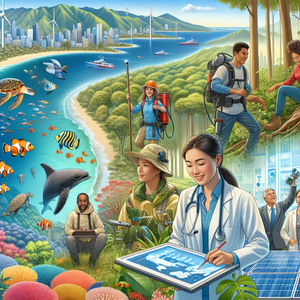
Exciting Career Opportunities with an Ecology Degree: 15 Diverse Paths to Explore
In an era where environmental stewardship is becoming increasingly critical, a degree in ecology opens doors to a multitude of rewarding career paths. As we face pressing environmental challenges, the need for skilled professionals who can navigate the complexities of ecosystems and advocate for sustainable practices has never been greater. This article delves into 15 fascinating job titles available to ecology graduates, each playing a vital role in conservation, education, and policy development. Whether your passion lies in wildlife conservation, community education, or influencing environmental legislation, a career in ecology can align with your interests and skills while contributing to the well-being of our planet.
Job Summaries:
Park Ranger:
- As guardians of natural parks, park rangers play a crucial role in preserving these spaces while educating the public about conservation.
- They monitor park activities, enforce regulations, and lead visitors in exploring nature.
- Typically requiring a degree in ecology or environmental science, this position is perfect for those who thrive in outdoor settings and enjoy public engagement.
Wildlife Specialist:
- These professionals are dedicated to the conservation and management of wildlife.
- They conduct surveys, track animal movements, and develop protection strategies for endangered species.
- A bachelor’s degree in ecology or biology is essential, along with field experience.
- Wildlife specialists are vital to maintaining biodiversity and ecological balance, making this role highly appealing for nature enthusiasts.
Environmental Consultant:
- Environmental consultants evaluate the potential impacts of projects on ecosystems.
- They provide solutions to ensure compliance with environmental regulations.
- A degree in environmental science or ecology is typically required.
- Relevant certifications are also important for these professionals.
- They help shape sustainable corporate practices.
- Their role is increasingly significant in today’s eco-conscious marketplace.
Field Ecologist:
- Conducting research in natural environments
- Field ecologists gather data on ecosystems and species interactions
- They design experiments and collaborate on conservation initiatives
- A degree in ecology or biology is required
- Strong analytical skills are necessary
- This role is essential for advancing ecological understanding
- Informs effective conservation strategies
Restoration Ecologist:
- Focused on rehabilitating damaged ecosystems
- Restoration ecologists assess degraded habitats
- Develop recovery plans
- A background in ecology or environmental science is crucial
- Complemented by hands-on restoration experience
- This career is rewarding for those committed to reversing ecological damage
- Fostering biodiversity
Environmental Field Technician:
- Supporting environmental research
- Collect and analyze data
- Perform soil and water tests
- Conduct wildlife surveys
- A degree in environmental science or ecology is beneficial
- Technical skills are important
- Foundational role for guiding ecological research and assessments
Marine Biologist:
- Investigating marine organisms and their ecosystems
- Marine biologists focus on species behavior and conservation strategies
- Typically requiring a degree in marine biology or ecology
- Along with field and lab experience
- This profession is critical for understanding ocean health
- Protecting marine biodiversity
Environmental Educator:
- Environmental educators design and implement programs to raise awareness about ecological issues.
- They create educational materials and engage communities through hands-on learning experiences.
- A degree in ecology or education, combined with strong communication skills, makes this role fulfilling for those passionate about community engagement in environmental stewardship.
Natural Resource Manager:
- Overseeing the sustainable use of natural resources.
- Develop management plans.
- Collaborate with stakeholders to maintain ecological balance.
- A degree in ecology, environmental science, or natural resource management is required.
- Leadership skills are necessary.
- Essential for promoting sustainability and effective resource management.
Ecological Research Scientist:
- Engaging in advanced research, these scientists seek to understand ecosystem dynamics and inform conservation practices.
- Typically requiring a Ph.D. in ecology or a related field, ecological research scientists significantly contribute to scientific knowledge, influencing environmental policies and practices.
Zoologist:
- Studying animal behavior and genetics
- Zoologists focus on species conservation and habitat preservation
- They conduct research and analyze data in labs or field settings
- A degree in zoology or ecology is essential
- Strong analytical skills are important
- This role is pivotal for guiding conservation initiatives.
Conservation Biologist:
- Protecting biodiversity
- Conservation biologists assess threats to species
- Develop recovery plans
- A degree in biology, ecology, or conservation science is required
- Field research experience is necessary
- This high-impact role addresses species extinction
- This high-impact role addresses ecosystem degradation challenges
Urban Ecologist:
- Examining the interaction between urban environments and natural ecosystems
- Urban ecologists analyze how urbanization affects wildlife and plant species
- They develop strategies to promote urban biodiversity
- A degree in ecology, urban planning, or environmental science is beneficial
- This role is increasingly vital as cities expand
Climate Change Analyst:
- These analysts research climate change effects on ecosystems and devise mitigation strategies.
- A background in environmental science or ecology is necessary, along with strong analytical skills.
- This critical role addresses one of today’s most pressing global challenges, emphasizing the importance of ecological expertise.
Ecotourism Coordinator:
- Promoting sustainable travel
- Ecotourism coordinators develop programs that benefit the environment and local communities
- A degree in ecology, tourism management, or environmental education is beneficial
- This role raises awareness about ecological issues
- Fostering sustainable economic development
Exploring these diverse career paths, individuals with an ecology degree can find fulfilling roles that make a tangible impact on environmental preservation and sustainability. Whether you lean toward hands-on fieldwork, research, policy-making, or community education, the opportunities in this field are extensive. If you're eager to discover job openings in ecology-related fields, look for resources that align your interests and qualifications with the dynamic job market in ecology. Your journey towards a meaningful career in environmental science awaits!
Explore More Jobs
